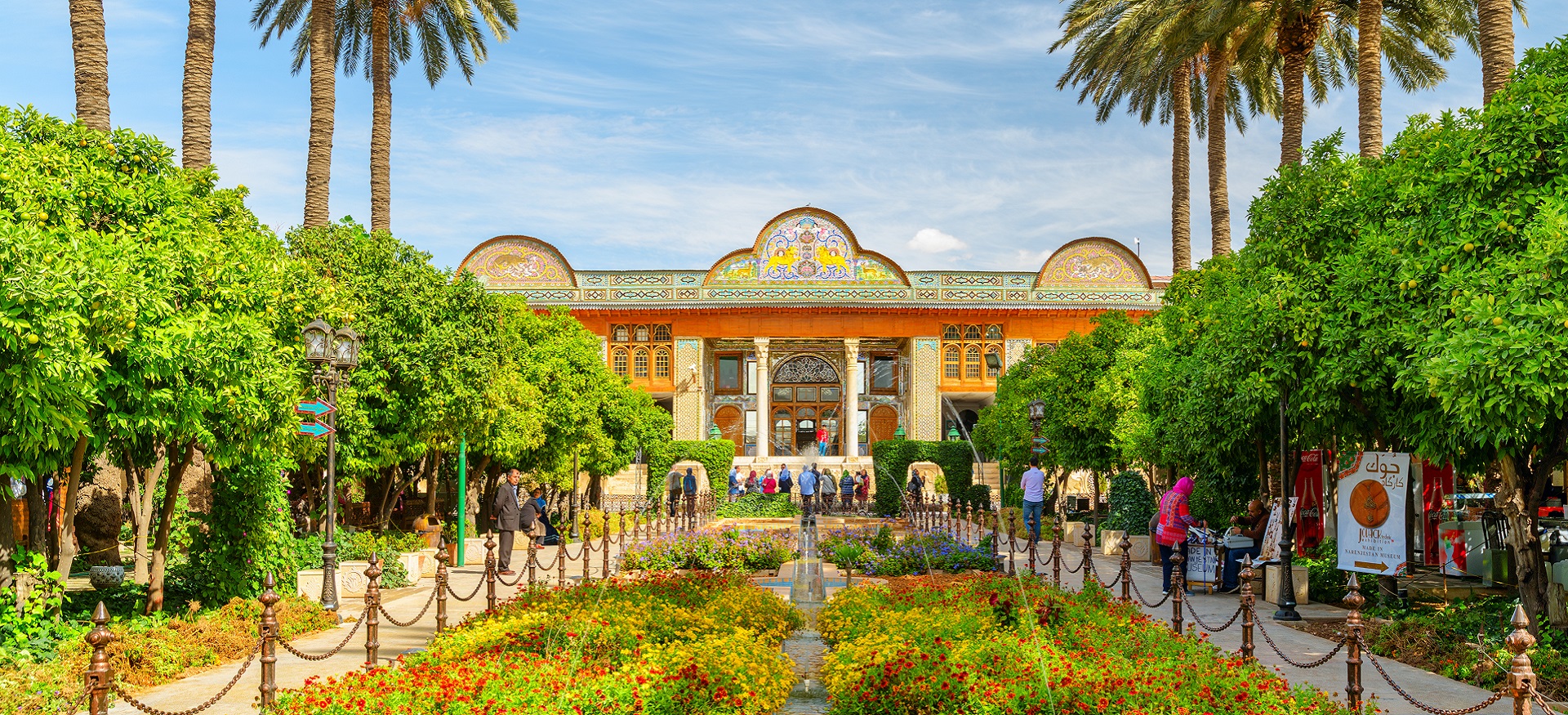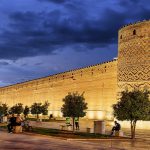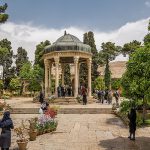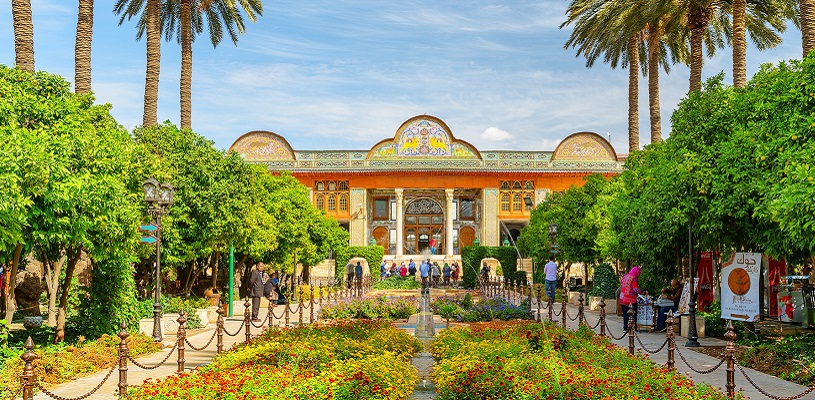
Qavam House (Narenjestan Qavam Garden) | Shiraz, Fars, Iran
If Shiraz is one of the loveliest cities in Iran, Qavam house (or Narenjestan Qavam) is one of the reasons why! As a reminder of Qajar era luxury, this historical mansion of Shirazi aristocrats will not miss to charm you at first sight. If the refinement of art, taste and skill employed in the house gives it half of its pleasant harmony, the lovely garden that fills the air with the scent of sour orange blossoms in Spring is definitely the other half. Follow me to find out where the house’s charisma comes from.
Contents
- 1 Why Visit Qavam House?
- 2 Who were the Qavam Family
- 3 The Story of Qavam House
- 4 Architecture of Qavam House
- 5 The Biruni of Narenjestan Garden – Qavam House
- 6 The Main Imaret of Narenjestan Qavam
- 7 The Precious Museum of Qavam House
- 8 The Spring Charms of Narenjestan Garden in Qavam House
- 9 More About Qavam House
- 10 Like to see Qavam House?
- 11 Narenjestan Garden on Map
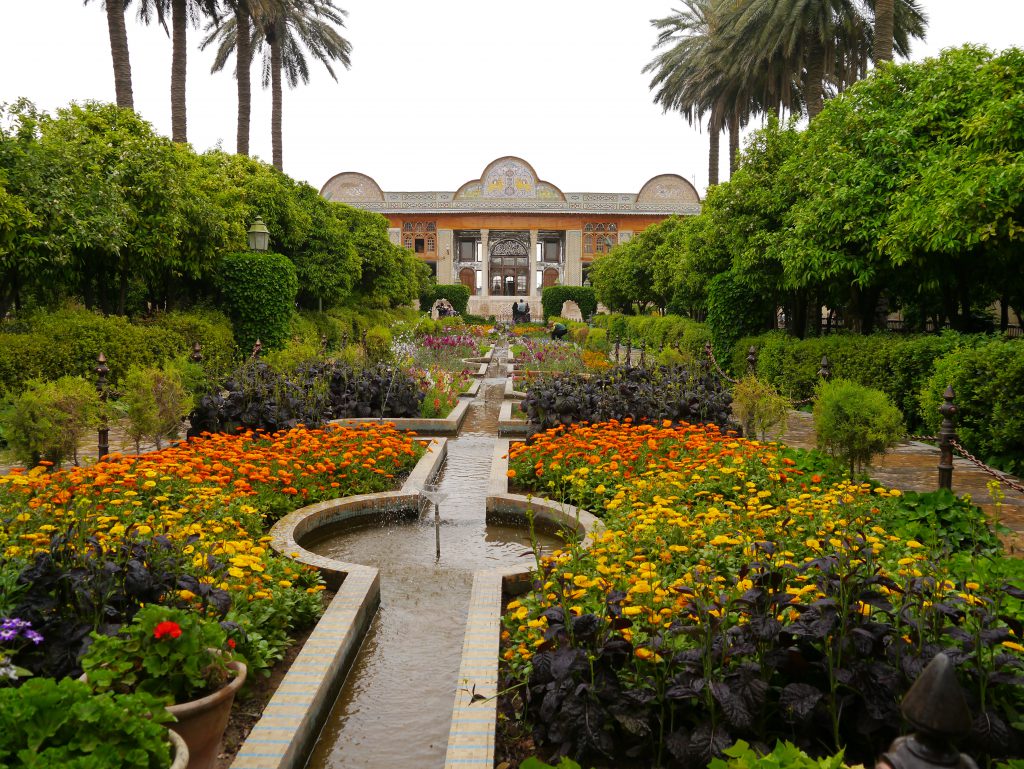
Qavam House photo
Why Visit Qavam House?
- Qavam House is one of Iran’s most beautiful and most popular mansions
- The springs of Narenjestan Qavam are a MUST-SEE
- The mansion showcases the gorgeous elements of Persian architecture
- It includes a museum of photographs, books and archeological artifacts
- It introduces you to the history of Shiraz
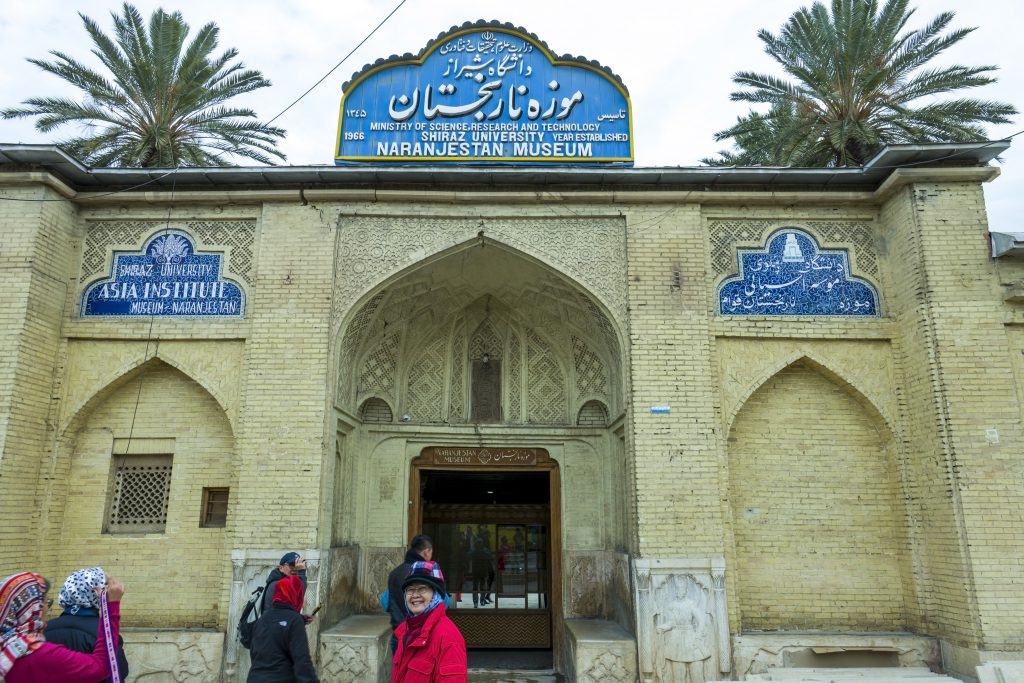
The entrance of Qavam House photo
Who were the Qavam Family
As the governing power of Fars for centuries, the wealthy family were very powerful in Shiraz. So powerful that people of Shiraz used to say: “Before Reza Shah Pahlavi, the Qavam were king here”. Originally merchants from Qazvin, Qavam family soon gained political power during Zand period. Then they extended their influence throughout Qajar and Pahlavi periods. They were occasionally subject to the royalties’ changing opinion and trust of them and were at a point even executed to death. Yet, they were masters of regaining the trust. Kerman’s Biglar-Beygi Garden, Tabriz’s Kalantar Garden and Shiraz’s Afif-Abad Garden, Delgosha Garden, Qavam House and Zinat-ol-Molk traditional house are of the well-known relics of the authority and affluence of this aristocratic family.
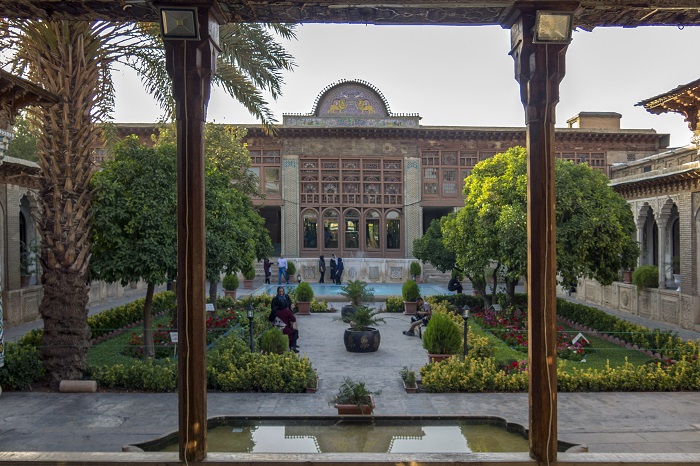
Zinat-ol-Molk traditional house
The Story of Qavam House
In late 19th century, a member of Qavam family became the governor of Shiraz and started the construction of a luxurious complex. Yet, he didn’t live long enough to finish it. But his son accomplished building what became the residence of generations of Qavam family. Other sections, including a bathhouse, a Hussainiya (a kind of religious center), a school, and a stable were originally part of the complex. As the Biruni (the outer quarter of traditional Iranian houses), the structure now known as Qavam House was used for public receptions. Zinat-ol-Moluk House, was also attached to it as Andaruni (the private quarter of traditional Iranian houses). In 1969, the mansion was renovated and used as Pahlavi University’s Asia Institute.
Architecture of Qavam House
The Biruni of Narenjestan Garden – Qavam House
As the public section of the house, Narenjestan Qavam elaborately combines the charms of a traditional Iranian house and some elements of a Persian Garden. It used to be connected to the Andaruni with an underground passage. At the entrance, the carved figures of 2 Qajar soldiers holding rifles welcome you to the charms of the historical house. Then, the beautifully carved wooden door of the house opens to a Hashti (entrance hall). The ceiling of this hall features fine tiling and plaster muqarnas work. The Hashti leads you to a lovely garden filled mainly with sour orange trees. The abundance of these trees in the garden has given the house the name of Narenejstan (sour orange orchard). The garden is symmetrically designed and has a pool in the center. You’ll find Imarets in its northern, southern and eastern sides, and 21 Iwans all around the courtyard.
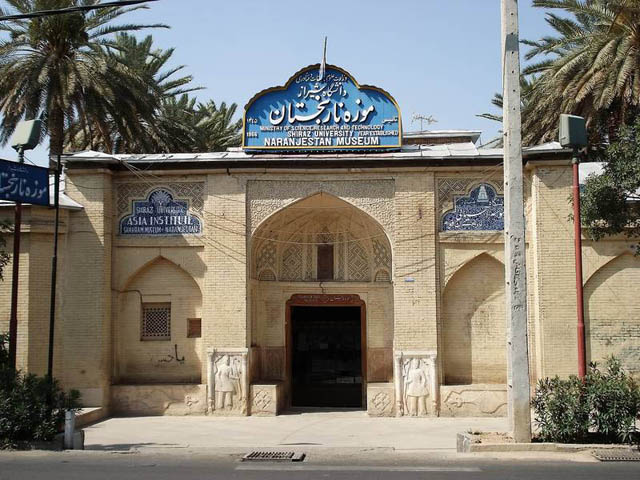
The entrance of Qavam house photo – Narenjestan Garden
The Main Imaret of Narenjestan Qavam
In the main and the most elegant Imaret, the northern, you can find 2 floors and a basement. The general design of this Imaret and its columned Iwan is an adaptation of Zandieh style of architecture. The intricacy of the tiling, the Orsi (stained-glass windows) and the stone carvings displayed in the façade is only an introduction to the artistic beauties you’ll discover inside. The stone carvings below the main Iwan were inspired by Persepolis. Plus, calligraphed verses of Quran and colorful paintings have doubled the beauty of the building. Overlooking the garden, the central Iwan also showcases fine Iranian mirror work.
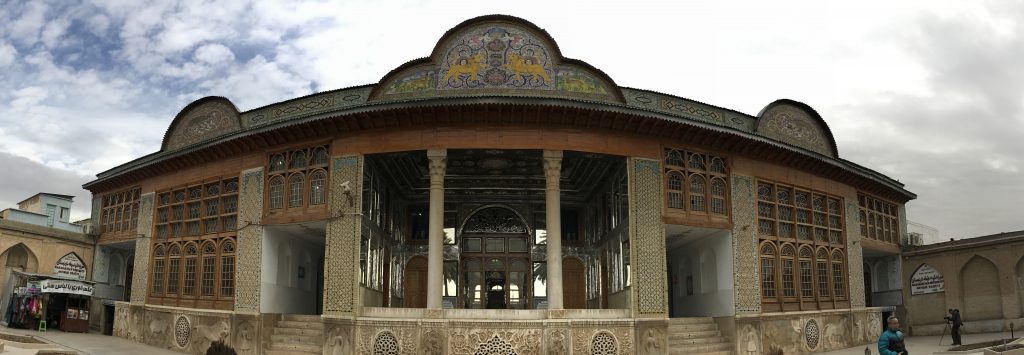
Main Imaret of Qavam house photo
Two short staircases on both sides of the northern Iwan lead to the chambers. Covered with intricate plasterwork, mirrorwork, brickwork, tilework, paintings, inlaid wooden panels and antique furniture, each room is a unique work of art. Above all, the upstairs guest rooms feature amazing ceiling paintings that include European and Victorian-era motifs. The oil paintings of the ceilings are characteristic of Zand and Qajar periods. The main hall, known as the Mirror hall, will catch your eyes with the glamour of its fine Qajar mirrorwork.
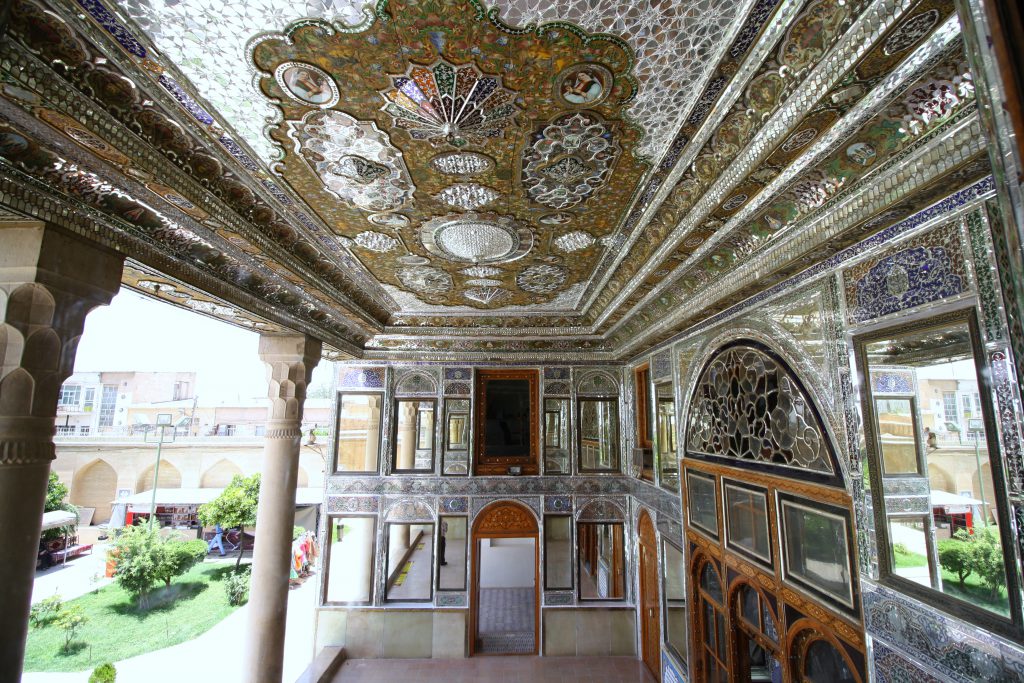
Mirrorwork Iin the main hall of Qavam house photo
The Precious Museum of Qavam House
Qavam house was once the headquarter of Pahlavi University’s Asia Institute directed by American archeologist Arthur Upham Pope. As a result, Narenjestan Garden protects a collection of photographs, books and archeological artifacts. So, the basement of the northern section houses an archeological museum with a collection of Iranian antiques from various historical periods. Among them you can find dishware, coins, pictures, etc. You can also find fine works of art inspired by antique designs in the museum’s gift shop.
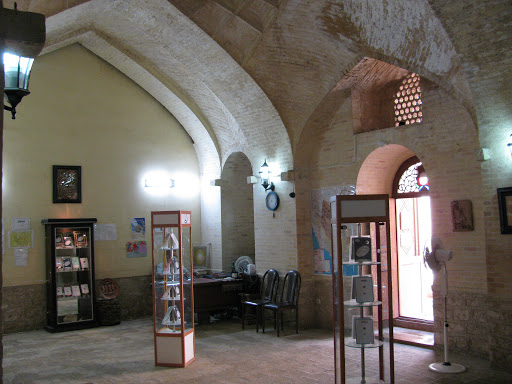
Qavam house museum
The Spring Charms of Narenjestan Garden in Qavam House
Anyone who’s visited Qavam House in April will recommend it! Why? Because this time of year brings an unforgettable ambiance to the garden. It intoxicates visitors with the aroma of sour orange blossoms and the colorful sight of spring flowers.
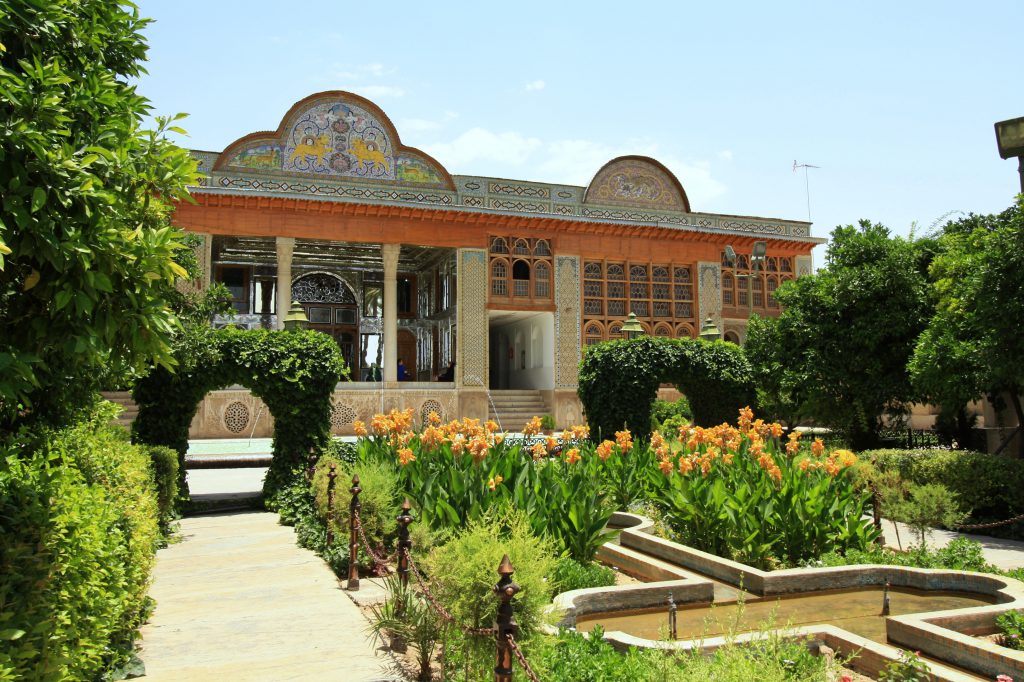
Qavam House photo
More About Qavam House
Visit Hours
8 a.m. to 8 p.m.
Visit Days
All days except some public holidays.
The Nearby Attractions
If you’ve seen the Biruni of Qavam House, you must also visit the lovely Andaruni: Zinat-ol-Molk house. Shiraz’s historical school, Madrase-ye Khan, is also nearby. But if you’d like to see more popular sites, the charming Pink Mosque could be the best option. Besides, the glamorous Shah Cheragh, and the historical Vakil complex (Vakil Bazaar, Vakil Bathhouse and Vakil Mosque) would be nice choices.
Where to Eat Near Qavam House
Joulep Café Restaurant
House of Elephant
Hooran Narenjestan
Dash Akol
Sharze Restaurant
Vakil Cultural House
Saray-e Mehr
Like to see Qavam House?
All of our multi-day Cultural Tours include a visit to Narenjestan Qavam Garden Mansion.

